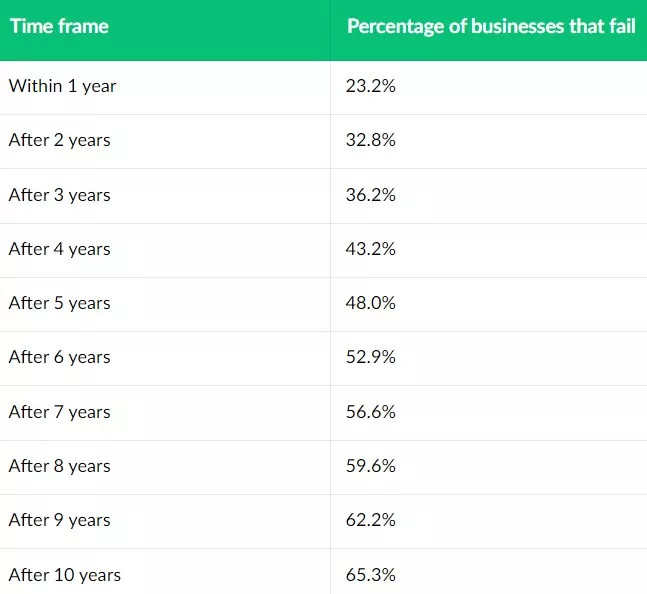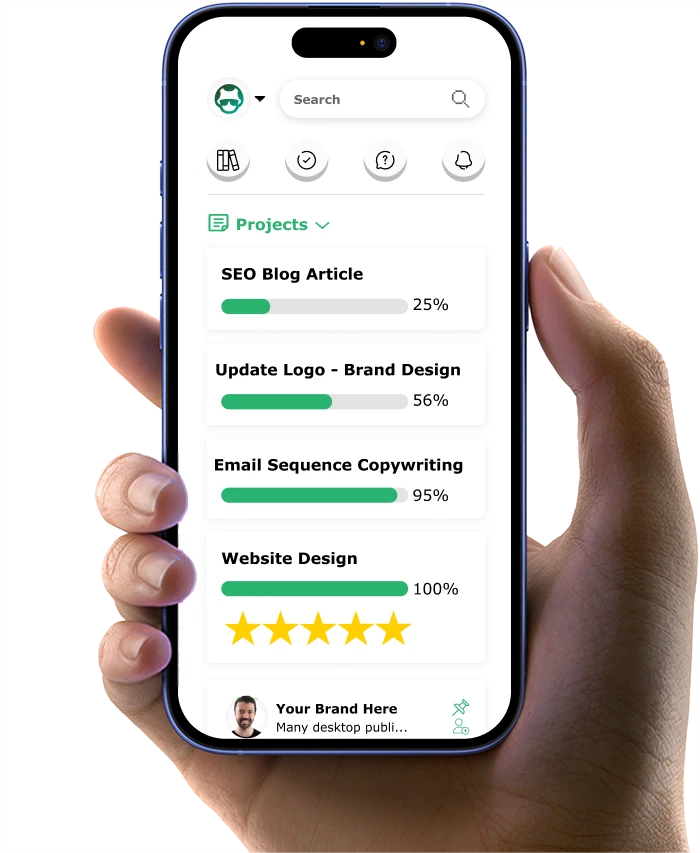You're Going to F Up... (Perfection is a Path)

Making mistakes is part of the journey, right? As a young entrepreneur, I often faced failure, like the time I walked door-to-door in college, offering a digital text message coupon service. Despite my initial shyness and fear of rejection, I persisted and eventually found success.
Did you know that 90% of startups fail? This statistic highlights the importance of resilience and learning from failure.
In this article, you'll discover:
- How to move from failure to failure without losing enthusiasm.
- The concept of ego death and its impact on business growth.
- Real-life examples of overcoming business challenges.
Ready to transform your perspective on failure and drive your business forward? Let's dive in and explore these insights together.
Avoiding AI pitfalls in your business? Begin your journey to smarter growth with Growbo. For just $1, access Growbo's platform built to simplify your business, boost efficiency, and accelerate growth—while ensuring seamless integration with your current team.
The Misunderstood Path to Victory
Diving into the deep end of business statistics reveals a sobering truth:
- 23.2% of private sector businesses in the U.S. fail within the first year
- After five years, that number rises to 48.0%
- After 10 years, 65.3% of businesses have closed their doors for good

These figures serve as a stark reminder that failure is a common part of the entrepreneurial landscape.
Winston Churchill’s insight, “Success is the ability to move from failure to failure without losing your enthusiasm,” offers a powerful perspective in facing these odds. Rather than a defeatist view, he relied on a resilient approach to overcoming hurdles.
This isn’t just about building the tenacity needed to thrive amid challenges — a crucial trait found in successful entrepreneurs.
In other words (like from the great Rocky Balboa): “Nobody is gonna hit as hard as life. But it ain’t about how hard you hit. It’s about how hard you can get hit and keep moving forward.”
Time to Put Your Your Ego to Death
Ego death is about shedding that overinflated sense of self-importance that can cloud your judgment in business. It’s about refining your mindset so you can dodge blunders more gracefully.
Your ego can be your own worst enemy. It’s like having a sneaky little voice that whispers, “Hey, everything you do is perfect!” even when your last project tanked. By mastering ego death, you clear out the mental clutter that prevents you from seeing things as they really are—improving decision-making, fostering innovation, and ultimately boosting your business’s health.
With an ego, you might ignore critical feedback or double down on what isn’t working. But, if you’ve embraced ego death, you see setbacks for what they are: invaluable market signs. This isn’t failure; just pivot, tweak, and relaunch something even better.
Practical Tips: Embracing Ego Death
- Feedback Is Your Friend: Start loving those tough-love sessions. Encourage open feedback—even if it stings a bit—and watch your decisions improve.
- Reflect, Don’t React: Next time a project doesn’t go as planned, take a breath before blaming the world. Reflect on what went wrong, why, and how it can be fixed.
- Continuous Learning Is Key: Sign up for that workshop. Read that book. Chat with someone from a totally different field. Keep your brain hungry and your ego small.
Mistakes: The Inevitable Side Dish of Entrepreneurship
Okay, let’s lay it out there: Nobody starts their business day thinking, “I can’t wait to mess something up today!”
But here’s a hot take—mistakes are invaluable. Yep, you heard that right.
A recent survey by the social network Linkagoal found that fear of failure plagued 31% of 1,083 adult respondents—a larger percentage than those who feared spiders (30%), being home alone (9%), or even the paranormal (15%).
This shows just how deeply the dread of slipping up is embedded in our psyche, even more so than some of our primal fears!
In some areas of business, particularly those involving high volumes of transactions or interactions, achieving a 1% success rate can actually be a huge win. Think about online advertising or cold emailing, where conversion rates hovering around 1% are not uncommon and can still lead to significant profits.
This highlights an essential perspective shift—success in business isn’t always about big numbers but understanding the metrics that matter and how to leverage them effectively.
But why should we actually embrace these dreaded blunders? Each mistake in business is a potent catalyst for growth and innovation. Think about it: If over 30% of people are more scared of failing than of creepy crawlies, there’s a huge energy potential there to harness—from fear to fuel.
Turning that fear into a constructive force can transform your business approach, leading to breakthroughs and, ultimately, success.
Here are three quick tips to remember when you feel like you are failing:
- Analytical Autopsy: Don’t just cringe and move on when things go south. Dive deep into each mistake. Perform a “postmortem” to uncover what went wrong and why. Understanding the mechanics behind a mishap is the first step in ensuring it doesn’t repeat itself.
- Culture of Curiosity: Foster an environment where mistakes are not just tolerated but are seen as valuable learning opportunities. This shifts the team’s mindset from fear of failure to curiosity about how things work and how they can be improved.
- Rapid Response Routine: When mistakes happen, having a plan in place for quick recovery can turn potential disasters into minor setbacks. This not only limits damage but also shows your team and customers that you are capable of handling challenges efficiently.
Innovation often stems from the unexpected. Remember, some of the world’s most beloved products and services were born from errors. The sticky residue that led to Post-it Notes and penicillin discovered from a contaminated Petri dish are just a couple of examples. Each mistake carries the seed of a breakthrough.
Focus on Actions: Steering Your Business With Control and Adaptability
With all his talk about failure and success, it’s easy to become obsessed with outcomes.
Are we hitting our targets? Are the profits rolling in?
While these metrics are undoubtedly important, there’s something even more crucial: focusing on actions within your control. This approach shifts the emphasis from stressing over the results to ensuring the quality of the actions that lead to those results. By concentrating on what you can directly influence, you empower yourself to make impactful changes and adjustments, which ultimately shape your business’s path.
When you focus solely on outcomes, you risk overlooking the vital steps needed to reach them. Instead, adopt a process-oriented mindset.
This means setting clear, actionable goals and breaking down the larger tasks into manageable steps. For instance, rather than fixating on increasing customer retention by 20%, concentrate on the actions that contribute to customer satisfaction, such as improving your customer service channels or refining your product offerings.
These are the elements within your direct control that lead to achieving your larger goal.
All of this to say, don’t ever try to be perfect with your goals. There’s no final stop where everything is flawless. Perfection is a continuous path of improvement and adaptation. This means always being in a state of evaluation and reevaluation, fine-tuning processes, and enhancing strategies as you learn more about what works and what doesn’t.
Wrapping Up: Lessons From Edison
Thomas Edison’s journey to invent the incandescent light bulb, involving over 1,000 experiments, is a classic example of innovation through perseverance. His relentless testing and refusal to see each failure as a setback teaches us that significant breakthroughs require persistence and a willingness to learn from each attempt.
The journey to business excellence is a marathon, not a sprint. By embracing incremental progress, detaching one’s ego, and valuing emotional intelligence, businesses can build a foundation for sustained success.
Let’s remember these lessons moving forward and channel our resilience and innovation to achieve our goals. Onward and upward!
Keep Growin’, stay focused.

Image Credits:
1. https://www.lendingtree.com/business/small/failure-rate













